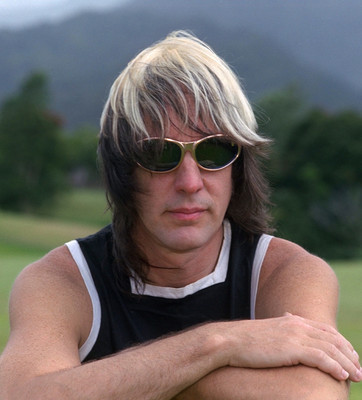Comfortably Eclectic

If Todd Rundgren felt a little schizophrenic singing for The New Cars, it’s nothing new.
"It certainly was a challenge having to take on the vocal persona of three singers for one gig," Rundgren says of the odd venture that found the rock veteran fronting a semireunion of the ’80s new wavers. Besides covering vocals by Ric Ocasek and Ben Orr, "I also had to be redolent of me. I had to remind people of me once in a while."
An occasional "Hello It’s Me" to the audience was only fair, since Rundgren’s 1973 hit came a full five years before The Cars, and his work is far more wide-ranging and prolific.
While The Cars never wavered in their sound, Rundgren never stuck with one for long — or toured in one configuration long enough for people to get used to it.
He hasn’t changed. "The ability — or the necessity — to be eclectic is something I’ve been comfortable with," Rundgren says.
After spending the summer on the nostalgia circuit with The Cars, Rundgren swings into Boulder Station today to feature his own formidable career — the guitar-based side of it, at least — "before I go off to sequester myself to record a new album."
With help from longtime collaborators Kasim Sultan on bass and Prairie Prince on drums, the 59-year-old Rundgren is using the two-week tour to revive a catalog that touches down on everything from Philadelphia soul to prog rock. He recorded one album, "A Capella," with just his voice, and a few others where he played every instrument himself. One album with his parallel-career band Utopia, "Deface the Music," was devoted to a spot-on imitation of the Beatles.
"I have a low threshold of boredom," Rundgren says. As a live performer, "I’m not long for any sort of gig that starts to turn into just a job. … I’m not likely to do the same sort of presentation for more than 18 months or two years at a time before I have to dream up something else."
And as a recording artist, "Even though I’ve had records that were commercially successful, I wasn’t disciplined enough to follow ’em up with more of the same," he says with a laugh.
Rundgren’s 1972 opus "Something/Anything?" defined him as a singer-songwriter with a knack for timeless pop songs such as "I Saw the Light." But he immediately followed it with the disjointed and psychedelic "A Wizard, A True Star."
"People thought I was purposefully sabotaging my career," he recalls, but "I had a new awareness in my head and I had to try to represent it." Experiments often fail, "but that’s also the way you get lucky accidents which may eventually characterize your music. … My unabashedness and my willingness to incorporate all sorts of different influences ideally characterizes me, keeps me from sounding too much like any one of those influences."
By the mid-’70s, Rundgren was cranking out solo albums and Utopia band efforts at a pace that would be busy for either. "We were having the time of our lives, making music pretty much all day long," he says, "with our own studio (Bearsville in upstate New York) to fool around in.
"I would spend my time in probably three places: my loft, where I would sleep and compose, the studio where I would record and Max’s Kansas City (the legendary New York live venue), where I would hang out and get drunk every night."
Nowadays, he cops to "a broader range of responsibilities" and to being on a tighter budget.
The New Cars was a safe payday and a chance to be back in front of large crowds again. But it was also "a chance to broaden the scope of my vocal experience," he says. And when you back up and take a long view of it, not all that big of a departure.
"Maybe it’s because so much of my early musical influence included music from theater, anything from ‘West Side Story’ to Brecht and Weil to Gilbert and Sullivan. The idea of singing characters, of changing your voice or delivery to assume a certain character, didn’t seem to be a problem to me."